
Transcription
This class is really riling me ire!
Youth With Mental Health Disorders: Issues and Emerging Responses
Youth With Mental Health Disorders: Issues and Emerging Responses
by Joseph J. Cocozza and Kathleen R. Skowyra - Ph.D?
Tragic mass homicides by juveniles, documented cases of neglect and inadequate services, and Federal policy initiatives focusing on providing systems of care for at-risk juveniles have propelled mental health issues among juvenile offenders into the headlines.
As the former Administrator of the Office of Juvenile Justice and Delinquency Prevention (OJJDP) has observed (Bilchik, 1998):
It is crucial that we deal not only with the specific behaviour or circumstances that bring them [youth] to our attention, but also with their underlying, often long-term mental health and substance abuse problems.
Recognition of the Mental Health Needs of Youth
The mental health needs of youth in the juvenile system have received more attention at the Federal level in the past 2 years than in the past three decades combined. During the past 2 years:
- The Civil Rights Division of the U.S. Department of Justice undertook a series of investigations that documented the consistent inadequacy of mental health care and services in juvenile correctional facilities in a number of States (Butterfield, 1998). <--- EOP Lifetime!
- The U.S. Department of Health and Human Services' Center for Mental Health Services initiated the first national survey of juvenile justice facilities to identify available mental health services (Center for Mental Health Services, 1998).
- Congress considered several bills and amendments that mandated comprehensive mental health and substance abuse screening and treatment programs for youth in the juvenile justice system (Manisses Communications Group, Inc., 1999).
Joseph J. Cocozza, Ph.D., is Vice President of Policy Research Associates (PRA) and Director of the National GAINS Center for People with Co-Occuring Disorders in the Justice System. Kathleen R. Skowyra is an Area Manager (Violence and Criminal Justice) for PRA. PRA offers comprehensive services for the application of social science research methods to crucial policy issues at the Federal, State, and local levels.
Volume VII . Number 1 3
Borderline Personality Disorder
Juvenile Justice
The important of the mental health issue is also recognized at the State level, for example, in the response given recently by the Secretary of the Florida State Department of Juvenile Justice when asked about the most challenging issue facing juvenile corrections at the beginning of this century. His answer was not funding, sufficient beds, or security. Rather, the most challenging issue he identified was "providing specialized services such as mental health and substance abuse services within the juvenile correctional continuum" (Bankhead, 1999).
Our jails have once again become surrogate mental hospitals.
The current level of concern about the mental health needs of youth in the juvenile system stands in stark contrast to past neglect (Knitzer, 1982). A comprehensive review of the last several decades of research (Cocozza, 1992) concluded:
We still know very little about the mental health needs of youth who are involved in the juvenile justice system. There are no good national studies on the number of such youth who come in contact with the juvenile justice system. Systematic information on how services are organized and delivered across the country, or on how the mental health and juvenile justice systems coordinate their efforts, does not exist. Moreover, we have no adequate information on what services are provided, their quality and whether or not they make a difference.
What has led to this dramatic change? A number of different factors are involved, including the following:
- Growing recognition of the mental health needs of youth in general. As noted by a number of authors, children's and adolescents' mental health needs have historically been addressed inadequately in policy, practice, and research (Hartman, 1997; Burns, 1999). Only recently have the number of youth with mental illness and their level of unmet need been recognized (Burns, 1999).
Recent estimates place the rate of serious emotional disturbance among youth in the general population at 9 to 13 percent (Friedman et al., 1996), much higher than the 0.5- to 5-percent range previously used by State policymakers (Business Publishers, Inc., 1996).
- Increasing reliance on the justice system to care for individuals with mental illness. This trend has been clearly documented for the adult population. A report to Congress (Center for Mental Health Services, 1995:iii) found: "As jail and prison populations increased, and the number of persons with mental illness living at the fringe of their communities rose, the absolute number of persons with mental illness in jails and prisons also increased." The survey-based study Criminalizing the Seriously Mentally Ill (Torrey et al., 1992:iv) also concluded: "Our jails have once again become surrogate mental hospitals." Various other studies have confirmed that large proportions of individuals in the Nation's jails and prisons are seriously mentally ill. For example, Teplin (1990) reported prevalence rates of 6.4 percent for male jail inmates and 15 percent for female jail inmates. The most recent study released by the U.S. Department of Justice reported that 16 percent of State prisoners were identified as mentally ill (Ditton, 1999). Such findings buttress the view that "[j]ails and prisons have become the nation's new mental hospitals" (Butterfield, 1998a). As suggested above, policymakers, practitioners, and advocated now recognize that the same trends and issues exist in the juvenile justice system.
Recent changes in the juvenile justice system. The juvenile justice system has largely shifted away from treatment and rehabilitation and toward retribution and punishment as the "get tough" movement swept the Nation during the 1990's. The decade has seen more youth transferred to criminal court, longer sentences, and lower minimum ages at which juveniles can be prosecuted in the criminal justice system as if they were adults - all part of the "adultification" of juvenile justice (Altschuler, 1999). This trend toward criminalizing the juvenile justice system has raised questions about its role (Schwartz, 1999). The trend has also forced courts and the juvenile corrections system to address mental health-related issues for youth that had been previously restricted primarily to adults, such as the constitutional right to mental health treatment (Woolard et al., 1992), the applicability of the "not guilty by reason of insanity" defense (Heilbrun, Hawk, and Tate, 1996), and mental competency guidelines (Woolard, Repucci, and Redding, 1996).
Prevalence of Mental Health Disorders Among Youth
Despite the growing concern, there is a paucity of adequate research on the prevalence and types of mental health disorders among youth in the juvenile justice system. A comprehensive review of the research literature (Otto et al., 1992) found the research to be scarce and methodologically flawed. Other reviews have reached similar conclusions (Wierson, Forehand, and Frame, 1992).
Methodological problems include inconsistent definitions and measurements of mental illness; use of biased, non-random samples; reliance on retrospective case report data; and use of nonstandardized measurement instruments.
Despite these problems, some general conclusions can be drawn:
- Youth in the juvenile justice system experience substantially higher rates of mental health disorders than youth in the general population. This is a major conclusion drawn from a review of 34 studies (Otto et al., 1992) and is also consistent with the finding that mental illness prevalence rates in adult corrections populations are two to four times higher than the rates in the general adult population (Teplin, 1990).
Other posts by this author
|
2023 may 31

|
2023 apr 5

|
2023 mar 19

|
2023 mar 5

|
2023 mar 5

|
2023 mar 5

|
More... |
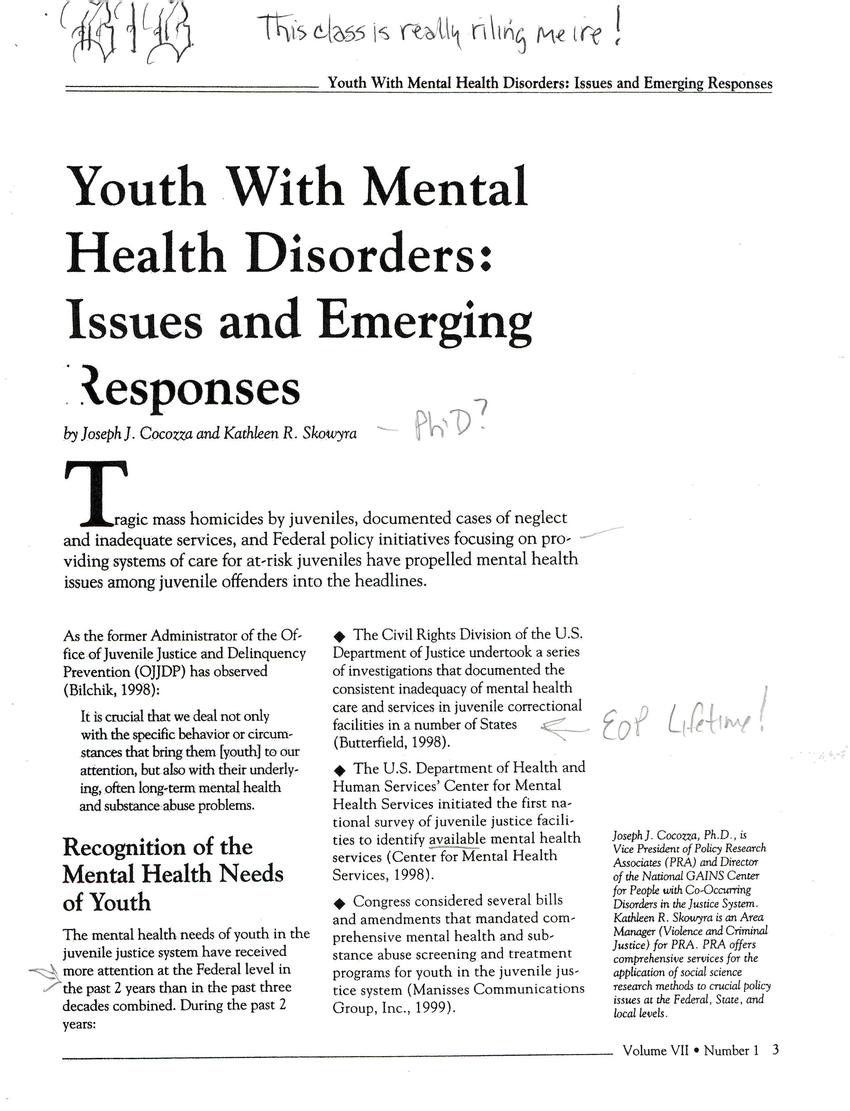

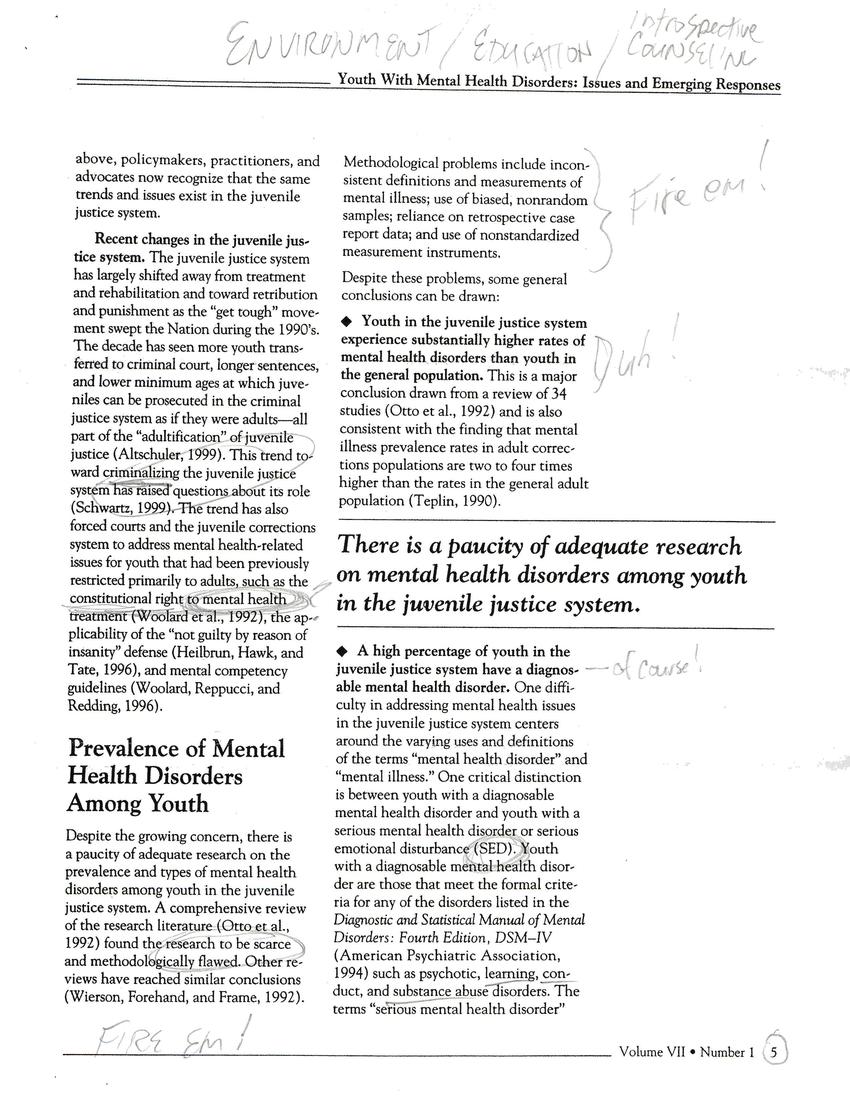
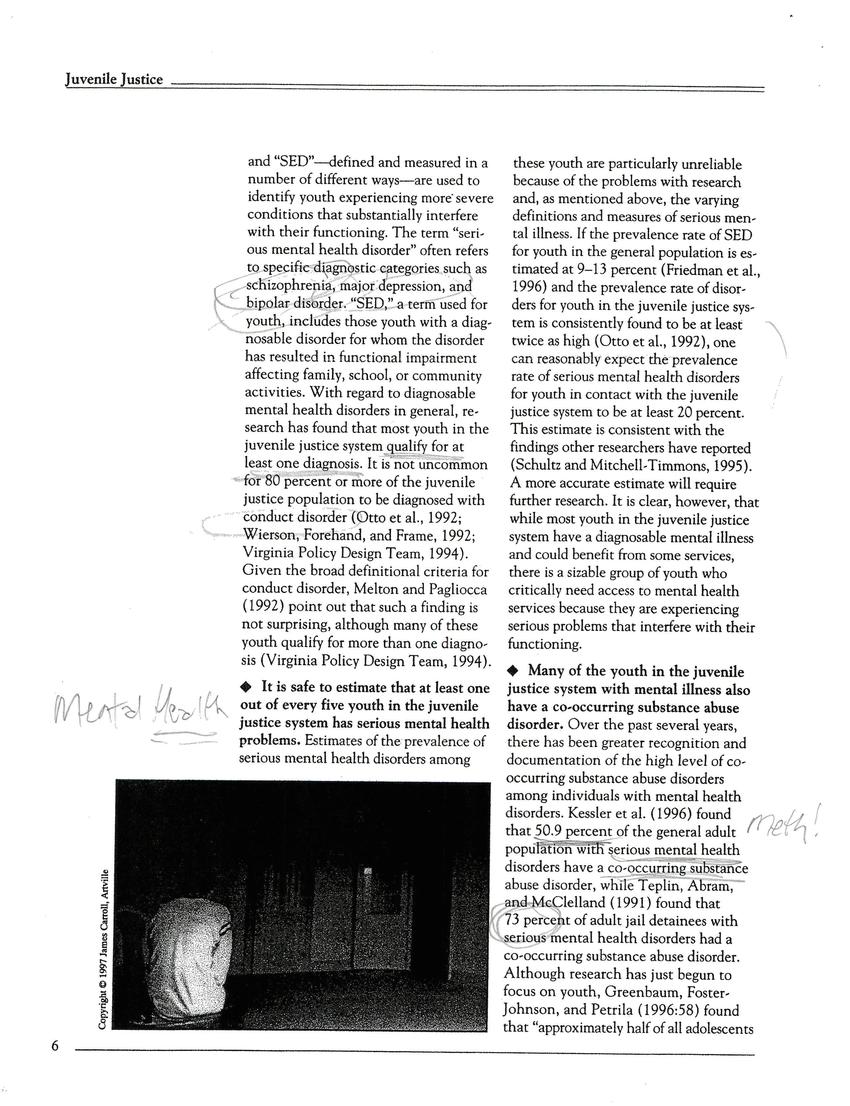
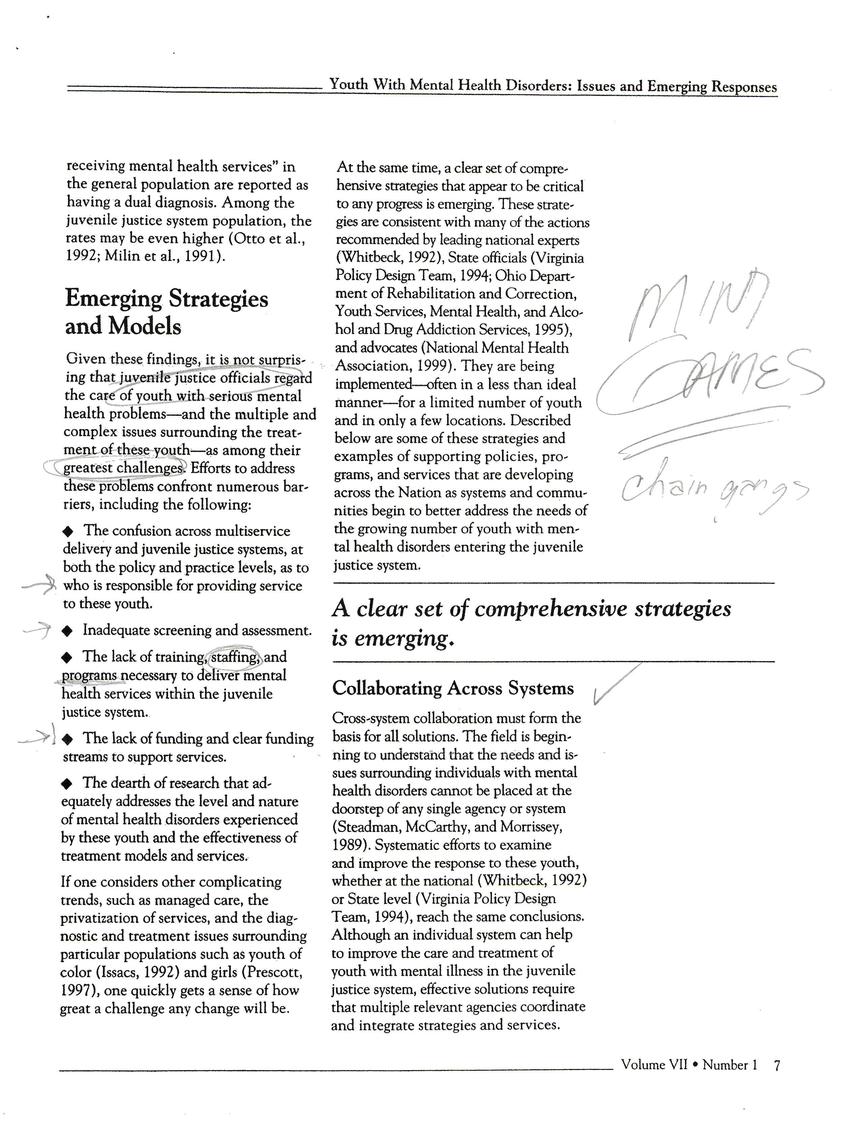
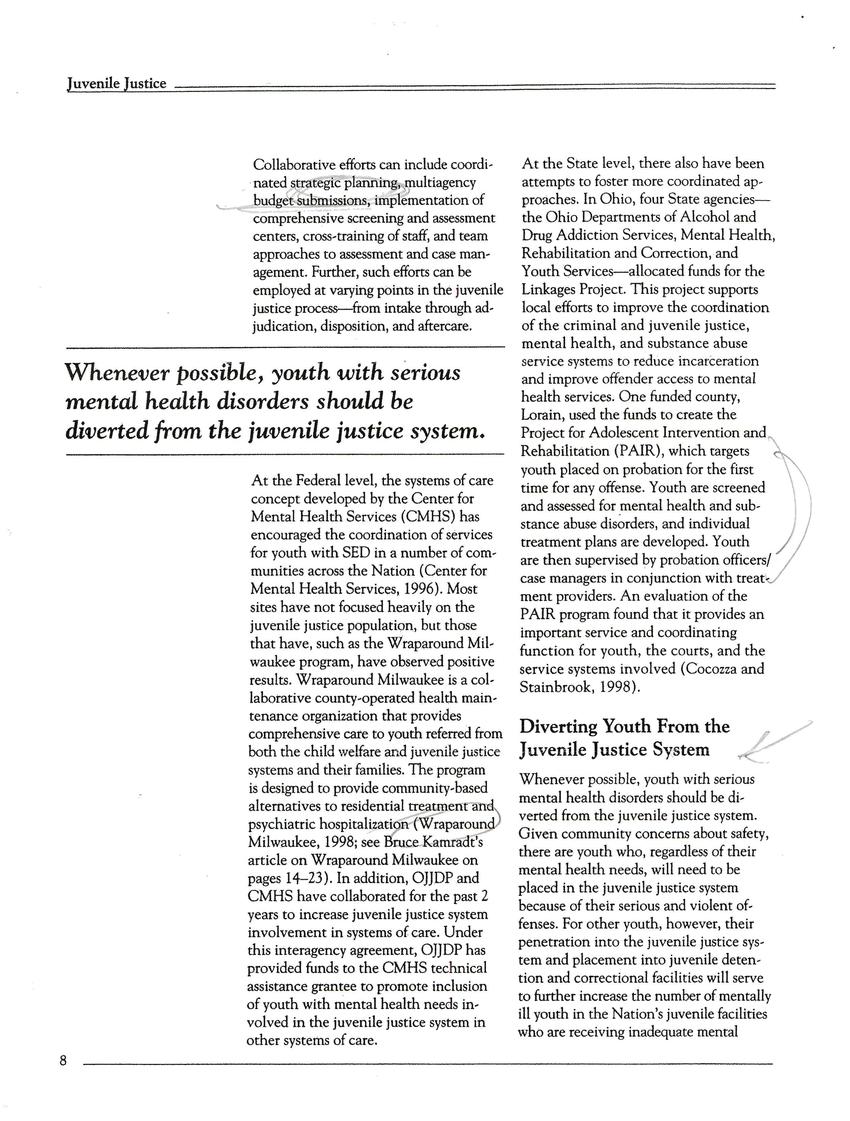

Replies